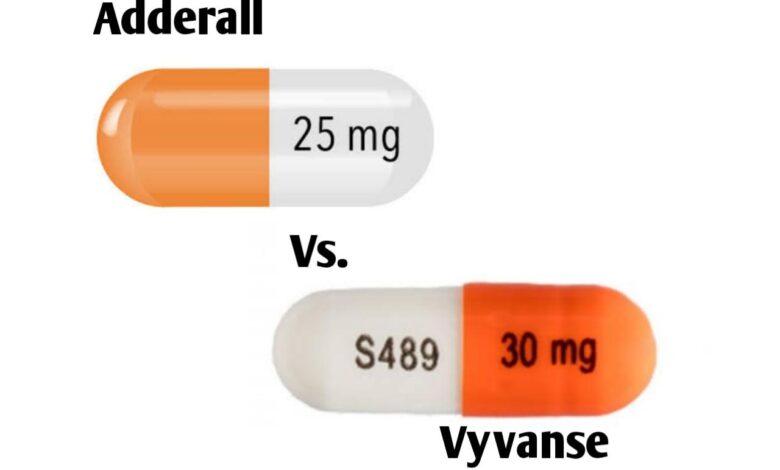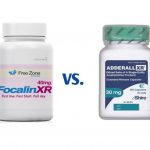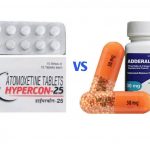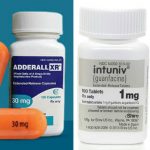Vyvanse vs Adderall: Differences and Similarities

Adderall contains a combination of amphetamine and dextroamphetamine. Amphetamine and dextroamphetamine are central nervous system stimulants that affect chemicals in the brain and nerves that contribute to hyperactivity and impulse control. Adderall is used to treat attention deficit hyperactivity disorder (ADHD) and narcolepsy.
For ADHD, Adderall is designed to improve hyperactivity, impulsive behavior, and attention span. According to the Cleveland Clinic, stimulants like Adderall improve symptoms of ADHD in 70 to 80 percent of children, and in 70 percent of adults. The positive effects can be even greater when it’s used along with behavioral therapy.
Adderall comes in either a tablet form or as a time-release capsule. It can interfere with sleep, so it should be taken in the morning. Your doctor will most likely start you off with a low dose to make sure you can tolerate it. Then, the dose can be slowly increased.
Vyvanse is a brand of Lisdexamfetamine also used as part of a treatment program to control symptoms of attention deficit hyperactivity disorder (ADHD) in adults and children. Vyvanse is also used to treat binge eating disorder (an eating disorder characterized by periods of uncontrolled overeating). Vyvanse is in a class of medications called central nervous system stimulants. It works by changing the amounts of certain natural substances in the brain.
Vyvanse comes as a capsule to be taken by mouth. It is usually taken once a day in the morning with or without food.
Are adderall and Vyvanse the same thing?
No, both Adderall and Vyvanse are central nervous system stimulants. Each is a medicine prescribed to treat attention deficit hyperactivity disorder (ADHD). Both drugs are derivatives of amphetamines. The difference between the drugs is Adderall contains amphetamine salts (amphetamine and dextroamphetamine), whereas Vyvanse contains lisdexamfetamine, which the body converts to dextroamphetamine before it is active, meaning it’s a “prodrug.”
The extra time the body takes to convert Vyvanse to dextroamphetamine tends to make the side effects less pronounced, but the side effects of each of these drugs are very similar. They include; anxiety, sleeplessness, digestive issues and some other problems.
Both Vyvanse and Adderall are in the amphetamine family of drugs, which means they have the potential to cause addiction and withdrawal symptoms.
What are the side effects of Vyvanse?
Vyvanse may cause side effects. Tell your doctor if any of these symptoms are severe or do not go away:
• sleepiness
• dizziness
• headache
• dry mouth
• constipation
• diarrhea
• nausea
• weight loss
Some side effects can be serious. If you experience any of these symptoms, stop taking Vyvanse and call your doctor immediately or get emergency medical treatment:
• slow or difficult speech
• weakness or numbness of an arm or leg
• seizures
• hallucinating (seeing things or hearing voices that do not exist)
• believing things that are not true
• feeling unusually suspicious of others
• mood swings
• motor or verbal tics
• hives
• rash
• swelling of the eyes, face, tongue, lips, or mouth
• blurred vision or other vision problems
• paleness or blue color of fingers or toes
• numbness, pain, or sensitivity to temperature in the fingers or toes
• unexplained wounds appearing on fingers or toes
Vyvanse may cause sudden death in children and teenagers, especially children and teenagers who have heart defects or serious heart problems. This medication also may cause sudden death, heart attack or stroke in adults, especially adults who have heart defects or serious heart problems. Call your doctor right away if you or your child has any signs of heart problems while taking this medication including: chest pain, shortness of breath, or fainting. Talk to your doctor about the risks of taking this medication.
Vyvanse may slow children’s growth or weight gain. Your child’s doctor will watch his or her growth carefully. Talk to your child’s doctor if you have concerns about your child’s growth or weight gain while he or she is taking this medication. Talk to your child’s doctor about the risks of giving Vyvanse to your child.
Vyvanse may cause other side effects. Call your doctor if you have any unusual side effects.
What Are Side Effects of Adderall?
Side effects of Adderall include:
• nervousness,
• restlessness,
• excitability,
• irritability,
• agitation,
• dizziness,
• headache,
• fear,
• anxiety,
• agitation,
• tremor,
• weakness,
• blurred vision,
• sleep problems (insomnia),
• dry mouth or unpleasant taste in the mouth,
• diarrhea,
• constipation,
• stomach pain,
• nausea,
• vomiting,
• fever,
• hair loss,
• loss of appetite,
• weight loss,
• loss of interest in sex,
• impotence,
• difficulty having an orgasm,
• increase blood pressure,
• increased heart rate, and
• heart palpitations.





